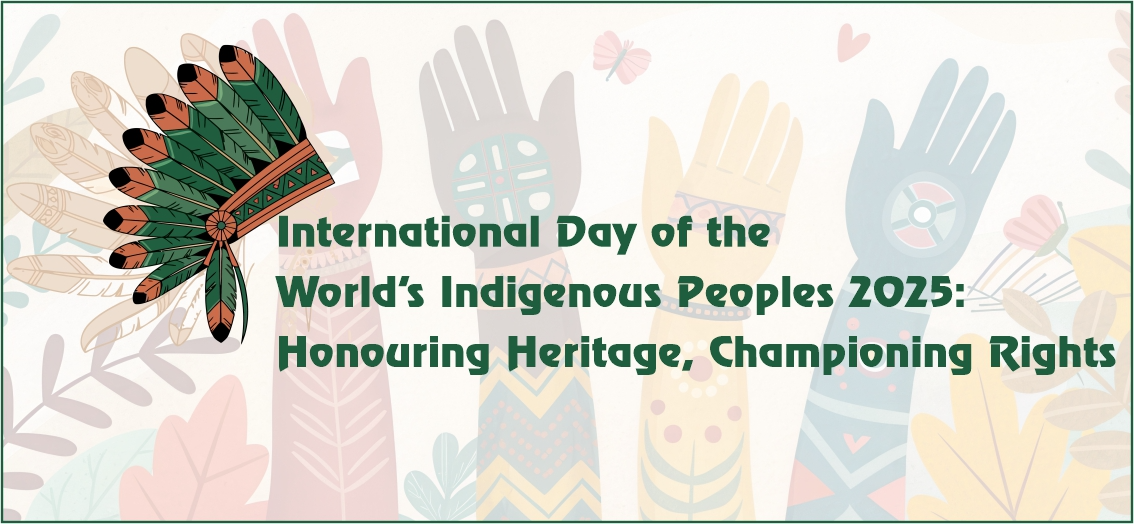International Day of the World's Indigenous Peoples 2025: Honouring Heritage, Championing Rights
Blogs Home
- 09 Aug 2025

Table of Contents:
- Introduction
- 2025 Theme: Indigenous Peoples’ Right to Self-Determination- A Pathway for Food Security and Sovereignty
- Global Contributions of Indigenous Peoples
- Navigating the Current Challenges and Roadblocks
- Effective Measures for the Empowerment of Indigenous Communities
- Indigenous Voices: Stories of Change
- Call to Action
Introduction
Every year on August 9, the world comes together to observe the International Day of the World's Indigenous Peoples, a day dedicated to acknowledging and upholding the rich diversity, cultures, and voices of Indigenous communities across the globe. The observance traces its origins to the United Nations' resolution in 1994, marking the anniversary of the first meeting of the UN Working Group on Indigenous Populations in 1982.
2025 Theme: Indigenous Peoples’ Right to Self-Determination- A Pathway for Food Security and Sovereignty
This year's theme highlights the essential link between autonomy over land and resources and Indigenous communities' ability to ensure their nourishment and well-being. The theme draws attention to the vital importance of allowing Indigenous Peoples to decide their development paths, control their food systems, and protect the biodiversity and traditional agricultural practices that sustain both their communities and the planet.
Global Contributions of Indigenous Peoples
Indigenous communities, making up about 6 percent of the world's population, steward roughly a quarter of the Earth's land surface and are custodians of some of the most critical ecosystems and biodiversity reserves. Their traditional knowledge, cultural practices, and sustainable land management methods help conserve forests, grasslands, water bodies, and agricultural biodiversity.
From the Amazon rainforest to the hill-tribes of North-East India, Indigenous groups have cultivated crops, preserved heirloom varieties, and protected pollinators through time-tested practices like rotational farming, polyculture, and agroforestry.
Their intimate relationship with the land, rooted in respect, reciprocity, and responsibility, offers valuable lessons in sustainability amidst widespread environmental degradation. The world’s remaining “intact” forests, vital carbon sinks, and genetic seed banks are overwhelmingly managed by Indigenous and local communities, making their role indispensable to combating climate change and safeguarding global biodiversity.
Navigating the Current Challenges and Roadblocks
Despite their significant contributions, Indigenous communities continue to face daunting challenges rooted in historic injustices and present-day inequities. Land dispossession, forced displacement, loss of language and culture, and limited access to education, healthcare, and legal protections are persistent realities for many Indigenous Peoples.
Additionally, the impacts of climate change are particularly acute for Indigenous communities due to their reliance on their immediate environment for food, livelihood, and cultural identity. Rising temperatures, erratic weather, and resource extraction threaten not only food systems but also the very existence of many traditional ways of life.
Women and girls from Indigenous backgrounds are often doubly marginalized, confronting systemic barriers to participation, representation, and essential services, as well as gender-based discrimination and violence. The barriers to consultation, fair legal recourse, and self-determined development continue to undermine progress, despite international declarations and commitments.
Effective Measures for the Empowerment of Indigenous Communities
Addressing these deep-rooted challenges requires collective, multi-faceted efforts:
- Legal recognition and enforcement of land and resource rights: Governments and stakeholders must prioritize demarcation, protection, and restoration of Indigenous territories, ensuring communities have decision-making power over their lands and resources.
- Support for Indigenous self-governance and participation: Empowering Indigenous-led institutions, including women and youth, in policy development and implementation is crucial for effective, context-sensitive solutions.
- Promotion of Indigenous knowledge systems: Integrating traditional agricultural, ecological, and medicinal knowledge into mainstream policies enhances food security and biodiversity conservation.
- Education and health interventions: Culturally appropriate, accessible education and healthcare should bridge historical gaps and promote Indigenous languages and worldviews.
- Economic empowerment and inclusive development: Ensuring fair participation in markets, fostering Indigenous entrepreneurship, and supporting community-led initiatives such as ecological tourism and art help build thriving communities without erasure or exploitation.
- Global solidarity and advocacy: The broader community can support Indigenous rights by championing causes, amplifying voices, supporting legal battles, and ensuring that international funding structures are accessible to Indigenous organizations and initiatives.
Indigenous Voices: Stories of Change
Indigenous women leaders and young activists are forging new pathways at international forums, combining ancestral wisdom with contemporary advocacy to secure rights, influence policy, and empower their peoples.
For example, the RISE Indigenous Voices Survey 2025 brings together countless stories and lived experiences to inform better policy and accountability, while Indigenous women’s leadership at the UN Permanent Forum on Indigenous Issues spotlights not just challenges but also achievements and hope for future generations.
Call to Action
The International Day of the World’s Indigenous Peoples is not just about celebration; it is a clarion call to recognize, respect, and defend the rights and dignity of Indigenous communities every day of the year. Whether as policymakers, educators, advocates, or allies, our actions can contribute to creating an inclusive world where self-determination, equality, and cultural diversity are not only protected but celebrated. Building just and resilient societies means standing with Indigenous Peoples in the pursuit of autonomy, justice, and harmony with nature.




